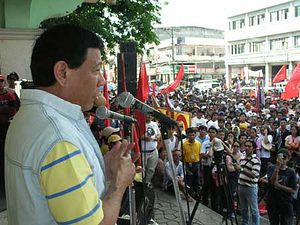After highly-publicized visits to China and Japan as well as trips to Indonesia, Brunei, Vietnam and Laos, Philippine President Rodrigo Duterte is set to visit Malaysia next week.
Duterte’s visit will reportedly occur from November 9 to 10. And though it might not get the kind of headlines that the trips to Beijing and Tokyo did, it is nonetheless significant (See: “The Limits of Duterte’s US-China Rebalance”). Duterte himself appeared to confirm this, saying in his characteristically blunt style last week that Malaysia would be the last stop on his tour because those were the only countries that mattered to him.
Ahead of the visit, Duterte has largely been stressing Malaysia’s significance to his administration in the security realm. That is no surprise. The two countries share a number of joint concerns, from terrorism with the rise of the Islamic State to piracy and kidnappings that occur along the Sulu Sea (See: “Confronting Threats in the Sulu-Sulawesi Seas: Opportunities and Challenges”). Indeed, Malaysia and the Philippines, along with Indonesia, recently reached an agreement on conducting trilateral patrols in the area that holds promise (See: “New Sulu Sea Trilateral Patrols Officially Launched in Indonesia”).
They also collaborate in areas that don’t get as much media attention relatively speaking, with Malaysia’s role in helping facilitate talks between the Philippine government and the Moro Islamic Liberation Front (MILF) in the country’s south, where Duterte is from, being just one example.
One item on the agenda, Duterte said previewing the visit on Tuesday according to Reuters, will be potential “joint military and police operations” with Malaysia to combat the militant threat both countries share, with have resulted in security challenges and undermined economic prosperity. Duterte also mentioned cracking down on piracy in the Malacca Straits, where there already has been a regular network of patrols developed to respond to the threat in the form of the Malacca Straits Patrols (MSP) between Indonesia, Singapore, Malaysia and Thailand, now in its tenth year, as opposed to the Sulu Sea, where things are just getting started.
He did not elaborate on the nature of these planned operations. Given his confusing remarks on a similar issue during his Indonesia trip, it would be best to reserve judgment until we see the formalized language in a joint statement as well as subsequent clarifications from his advisers.
Meanwhile, as both sides prepare for the visit, in an indicator of the broad network of ties in the security relationship, the crown prince of the Malaysian state of Perlis, while on a four-day trip to the Philippines, gave a speech at Camp Aguinaldo recommending avenues for collaboration between reservists from both sides. Prince Faizuddin is also commander of the 504th Regiment of the Malaysian Territorial Army, holding the rank of brigadier general, and heads the Malaysian Reserved Officers Training Unit.
How the visit itself actually plays out will be interesting to watch, including the chemistry between Najib and Duterte. Relations began a bit testily, with initially Duterte appearing to recognize the claim of the sultanate of Sulu which had ruled over parts of Sabah before the British had transferred it to the Federation of Malaysia in 1963, thereby resurrecting a thorny issue back in May. Sabah is a historical issue that also has contemporary relevance, given that Malaysia just in 2013 had seen over 200 descendants of the sultanate attempting to assert the Philippine claim to Sabah, leaving dozens of militants, civilians and Malaysian security forces dead in what is termed the Lahad Datu Incident.
Malaysia’s foreign ministry quickly dismissed Duterte’s statement. And at the Asia-Pacific Roundtable this year in Kuala Lumpur, Prime Minister Najib Razak rebuked Duterte’s suggestion that he might reignite the Sabah dispute, urging Manila to focus on resolving its decades-old-insurgency in the country’s south (See: “Malaysia Warns Philippines’ Duterte Against Reigniting Sabah Dispute”). Malaysia has also continued to strengthen its defense position in response to the Lahad Datu incident, as reflected in line items in its recent defense budgets.
But bilateral security cooperation, including exercises and exchanges, has continued on as usual in spite of Duterte’s rhetoric. And with inroads already being made in areas that Duterte finds critical for the Philippines’ security, he is unlikely to risk rankling Najib, who himself isn’t exactly aching for a squabble as he gears up for the next general election in Malaysia. But then again, with Duterte, who’s to say?

































